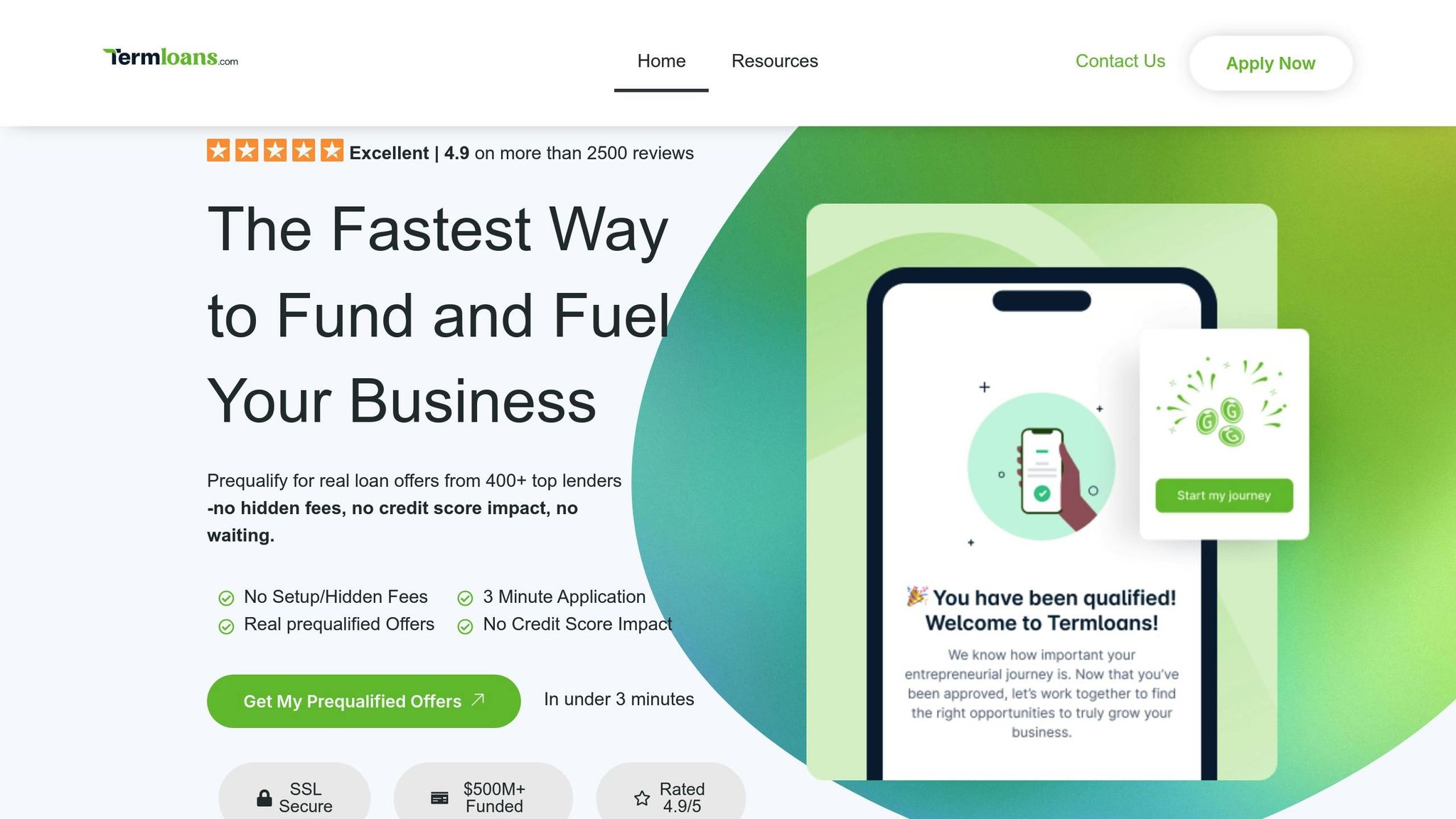Your credit score plays a major role in getting a business loan. It tells lenders how likely you are to repay the loan. Here’s the key:
- Higher credit scores (660+) mean better loan terms, lower interest rates, and higher approval chances.
- Lower scores (below 660) may lead to higher rates, stricter terms, or even rejection.
Lenders also look at other factors like your business’s finances, collateral, and industry type. For startups or businesses without a credit history, personal credit scores often matter more. Established businesses rely on their business credit scores.
Quick tips to improve your chances:
- Pay bills on time.
- Keep credit utilization low.
- Separate personal and business finances.
- Organize financial documents like tax returns, bank statements, and business plans.
If your credit score isn’t ideal, explore alternative lenders who may accept lower scores, though interest rates could be higher.
Loan Type Overview:
- Bank Loans: Require 700+ credit scores, offer low rates, but have slow approval.
- SBA Loans: Accept 620–640 scores, offer flexible terms, but need more paperwork.
- Alternative Financing: Accept scores below 630, provide fast funds, but with higher rates.
Start by checking your credit score and preparing your financial documents to improve your chances.
Personal vs. Business Credit Scores Explained
When seeking business financing, lenders typically evaluate two types of credit scores: personal credit scores and business credit scores. Personal credit scores are often used for startups or businesses that haven’t yet built a strong financial track record. Business credit scores, on the other hand, develop as your company establishes its own credit history. This distinction is particularly relevant for traditional bank loans, SBA loans, and business credit cards, which often require a personal guarantee. Let’s break down how each score works and its role in securing financing.
How Personal Credit Scores Work
A personal credit score represents your individual financial behavior and credit management. Lenders rely heavily on this score to evaluate your eligibility for loans, especially if your business is new or hasn’t established its own credit profile yet. It’s essentially a snapshot of your personal financial trustworthiness, which can significantly influence your ability to secure funding.
How Business Credit Scores Work
As your business grows and builds its own financial record, it develops a separate business credit score. This score allows lenders to assess your company’s creditworthiness independently of your personal finances. Over time, a strong business credit score can open doors to more financing opportunities and better terms, as it demonstrates your company’s ability to manage credit responsibly.
Other Factors Lenders Review Besides Credit Scores
While credit scores play a crucial role in lending decisions, they’re not the only consideration. Lenders look at a variety of other factors to assess risk and determine whether to approve your application. Knowing these additional criteria can help you strengthen your case and improve your chances of securing a loan.
The 5 Cs of Credit
The 5 Cs of Credit provide a broader framework for lenders to evaluate your financial reliability. These elements go beyond just the numbers on your credit report:
- Character: This refers to your track record of making on-time payments and handling financial obligations responsibly.
- Capital: The personal or business funds you’ve invested, which demonstrate your commitment and reduce the lender’s risk.
- Capacity: Your ability to repay the loan, assessed through your income, cash flow, and financial statements.
- Collateral: Assets like real estate, equipment, or other valuables that can be used to secure the loan. While not all loans require collateral, offering it may lead to better terms.
- Conditions: External influences, such as the state of the economy, industry trends, and how you intend to use the loan, all factor into the lender’s decision.
Business Finances and Collateral Requirements
Lenders take a deep dive into your financial records to confirm your business generates enough revenue to handle loan repayments. They typically review documents such as profit and loss statements, balance sheets, and cash flow statements to ensure steady income, healthy profit margins, and positive cash flow trends.
Even if your business is profitable, timing issues with cash flow could raise concerns. That’s why it’s essential to demonstrate you have enough working capital to cover both daily operations and loan payments.
Revenue stability is another key consideration. Lenders often examine historical data to identify consistent revenue patterns, which help them gauge the reliability of your income over time.
Collateral requirements depend on the type and amount of the loan. Traditional bank loans often require significant collateral, such as property or equipment, to act as a safety net in case of default. However, alternative lending options may offer more flexibility, sometimes without requiring collateral at all.
Industry Type and Loan Purpose
Your industry can heavily influence your chances of loan approval. Some sectors are seen as riskier due to unpredictable revenue or regulatory challenges. For example, businesses in industries like gambling or adult entertainment may face stricter financing limitations. If your business operates in a high-risk sector, you might need to seek out lenders who specialize in your field.
Clearly outlining the purpose of your loan is just as important. Lenders want to ensure the funds align with your business needs and that you’re applying for the right type of financing. A well-documented loan proposal, supported by a detailed business plan, is often required. This proposal should explain your goals, how the loan will be used, and how you plan to repay it. It’s critical to demonstrate that your business generates enough cash flow to cover both ongoing expenses and the new loan payments.
Credit Score Requirements by Loan Type
Knowing the credit score requirements for different types of loans can help you align your financing choices with your credit profile. Each type of business loan has its own set of criteria, and understanding these can influence your chances of approval, the interest rates you’ll pay, and the terms you’ll receive.
Traditional Bank Loans
If you’re aiming for a loan from a traditional bank or credit union, you’ll need a strong credit score – typically 700 or higher. However, approval isn’t just about your credit score; banks also evaluate your business’s financial health and cash flow. While these loans come with competitive interest rates, usually between 6% and 13%, the application process can be time-consuming. Expect a waiting period of 2 to 4 weeks for approval.
SBA Loans
SBA loans are known for their flexibility and favorable terms. The minimum credit score required generally falls between 620 and 640, though some lenders might ask for scores as high as 680. Your credit score not only affects your eligibility but also influences the terms of the loan. Since SBA loans are partially backed by the government – guaranteeing between 50% and 90% of the loan amount – lenders are often more willing to work with applicants who have lower scores. Interest rates are capped by SBA guidelines, typically ranging from 7% to 11%, and repayment terms can extend up to 25 years for real estate loans or 10 years for working capital and equipment loans. However, the trade-off for these favorable terms is a lengthy application process, often taking 30 to 90 days due to the extensive documentation and two-stage approval process.
Alternative Financing Options
For businesses that don’t qualify for traditional or SBA loans, alternative lenders provide a more accessible option. These lenders often accept credit scores below 630. However, this flexibility comes at a cost – interest rates can range from 7% to 99% for online lenders, and merchant cash advances can reach rates as high as 200%. On the plus side, the application process is much faster, with funding decisions often made within days.
Here’s a quick comparison of loan types and their requirements:
| Loan Type | Minimum Credit Score | Interest Rate Range | Approval Timeline | Repayment Terms |
|---|---|---|---|---|
| Traditional Bank Loans | 700+ | 6–13% | 2–4 weeks | 5–10 years |
| SBA Loans | 620–640 | 7–11% | 30–90 days | Up to 25 years |
| Alternative Financing | Below 630 | 7–99% | Days to weeks | 6–18 months |
Alternative financing is often a lifeline for businesses needing quick funding or those with credit challenges. However, the higher interest rates mean these options are best suited for short-term needs or situations where the potential return outweighs the cost.
How to Improve Your Credit Profile
A strong credit profile can make all the difference when applying for loans, helping you secure approvals and better terms. Whether you’re focusing on personal credit, business credit, or both, using effective strategies can put you in a better position for financial success.
Ways to Boost Your Credit Scores
Improving your credit scores is one of the most direct ways to strengthen your loan applications. Start by ensuring payments are made on time – this is the biggest factor in determining your credit score. To stay consistent, set up automatic payments or use reminders.
Another crucial step is managing your credit utilization. Aim to keep balances below 30% of your available credit limits, though lowering utilization even further can have an even greater impact. If you’re dealing with high balances, consider spreading payments throughout the month or asking for a credit limit increase.
Check your credit reports regularly to spot errors. Dispute inaccuracies like incorrect late payments, accounts you don’t recognize, or outdated information, as these can drag down your score. Additionally, maintain older accounts to lengthen your credit history, or consider becoming an authorized user on an account with a solid payment record.
Keeping Personal and Business Finances Separate
Separating personal and business finances is key to protecting your personal credit while showcasing sound financial management. Start by obtaining an Employer Identification Number (EIN) from the IRS, even if you’re a sole proprietor. This allows you to open business accounts and apply for business credit without relying on your Social Security Number.
Opening a dedicated business bank account is another essential step. Use this account exclusively for business transactions – it simplifies bookkeeping and demonstrates professionalism.
You might also consider applying for a business credit card and using it responsibly for business-related expenses. Many of these cards report to commercial credit bureaus, helping to establish your business credit profile. Additionally, setting up trade lines with vendors or suppliers who report payment histories can further strengthen your credit standing. These measures not only safeguard your personal credit but also build a solid business credit foundation, which lenders look for during evaluations.
Getting Your Financial Documents Ready
When applying for a loan, having well-organized financial documents can make the process much smoother. Lenders rely on these records to assess your financial health and ability to repay.
- Core Financial Statements: Be prepared to provide a Profit and Loss (P&L) Statement, Cash Flow Statement, and Balance Sheet. These should be recent (within the last 60–90 days) and may also include documents from the past three fiscal years.
- Bank Statements: Lenders typically review business bank statements from the last three months to one year to evaluate deposits, withdrawals, and overall financial stability.
- Tax Returns: Both your business and personal tax returns for the past three years are usually required. These help verify income and assess your debt-to-income ratio.
- Business Plan: A clear business plan should outline your financial projections, funding needs, and an executive summary explaining your operations and how you plan to use the loan.
- Collateral Documentation: If the loan requires collateral, be ready with documents like appraisals, property deeds, equipment invoices, and proof of ownership. Include the current value of assets such as real estate, equipment, or inventory.
- Outstanding Obligations and Debts: Prepare a detailed list of your existing financial commitments, such as loans, leases, and other agreements. Include the lender’s name, balance, credit limit, and monthly payment details.
- Personal Financial Information: Many lenders also review your personal finances. Gather income records, asset statements, investment details, and information on personal loans or credit cards. Your personal credit score and report will also play a role in their assessment.
Since document requirements can vary by lender, it’s a good idea to check with yours to confirm exactly what they need. Being organized not only speeds up the process but also leaves a positive impression.
sbb-itb-669c370
Business Financing Solutions with TermLoans.com

TermLoans.com offers quick and accessible financing options for businesses, accommodating a range of credit profiles. Understanding how credit scores impact loan terms, the platform provides tailored solutions to overcome credit challenges and meet diverse financial needs.
Loan Options for Every Credit Profile
TermLoans.com features four key financing options designed to suit a variety of business needs and credit situations:
- Business Term Loans: These loans provide structured financing with flexible terms and competitive rates, offering up to $5 million. They’re ideal for businesses looking to expand, purchase equipment, or address cash flow issues.
- Business Lines of Credit: This option offers revolving credit, allowing businesses to draw funds as needed and pay interest only on the amount used. It’s a practical choice for managing seasonal shifts or unexpected expenses.
- SBA Loans: Backed by the Small Business Administration, these loans come with lower interest rates and longer repayment terms. They’re an excellent option for businesses that may not qualify for traditional bank loans, thanks to more lenient credit requirements.
- 0% Interest Bank Financing: For qualifying businesses, this program provides financing with no interest, helping reduce capital costs and support growth. It’s particularly helpful for businesses with strong fundamentals but temporary credit challenges.
Each of these options is paired with a streamlined application process, ensuring businesses can access the funds they need without unnecessary delays.
Streamlined Application Process
The application process at TermLoans.com is designed to save time and reduce hassle. The online platform enables businesses to submit their information digitally, with pre-approvals provided quickly. This gives you a clear picture of your funding options before committing to a full application.
Once approved, funding is delivered within 24 hours. This speed is crucial for businesses facing urgent cash flow needs or time-sensitive opportunities, allowing you to focus on operations rather than getting bogged down in paperwork.
Customized Lending Solutions
TermLoans.com goes beyond offering just a variety of loan options – it personalizes financing to fit your business’s unique needs. Instead of relying on generic loan products, they evaluate your credit profile, cash flow, industry specifics, and funding goals to recommend the best solution.
A complimentary financial analysis is part of the process, helping you understand which financing option aligns with your business objectives. This approach ensures that even businesses with credit challenges can secure funding, as TermLoans.com focuses on overall performance and cash flow rather than just credit scores.
Transparency is a priority, with clear explanations of rates and repayment terms provided upfront. This means no hidden fees or surprises, empowering you to make well-informed decisions about your business’s financial future.
Conclusion: Getting Ready for Loan Approval
Key Points to Remember
When it comes to getting a business loan, your credit score is a major factor. Traditional banks typically look for a personal credit score of 680 or higher, but alternative lenders might consider scores as low as 500. Beyond credit scores, lenders also evaluate other factors like the 5 Cs of credit: character, capacity, capital, collateral, and conditions.
A higher credit score can lead to better loan terms – think lower interest rates, larger loan amounts, and more flexible repayment options. However, even if your credit score isn’t ideal, strong business financials, collateral, or a clear loan purpose can sometimes tip the scales in your favor.
Choosing the right lender can make a big difference. For instance, TermLoans.com offers financing options tailored to businesses with diverse credit histories. Whether it’s a traditional term loan or 0% interest bank financing, they show how working with a lender that understands your situation can open doors, even if your credit profile isn’t perfect.
Use these takeaways to guide your next steps and improve your chances of getting approved.
What Business Owners Should Do Next
To set yourself up for success, start by checking both your personal and business credit scores. Knowing where you stand will help you focus on lenders that align with your profile. If you spot any errors or negative marks on your credit reports, work to correct them and prepare explanations for any discrepancies.
You can boost your credit profile by staying on top of bill payments, keeping your credit utilization low, and avoiding too many new credit applications.
Also, gather key documents like tax returns, bank statements, and a solid business plan. Being organized not only speeds up the application process but also helps showcase your business’s financial health.
Finally, don’t limit yourself to traditional banks, especially if your credit score is below 680. Look into alternative lenders and platforms that cater to a broader range of credit profiles. Consider getting a free financial analysis to pinpoint the best financing option for your business goals. The right preparation and research can help you find funding that fits your needs.
FAQs
How can I improve my credit scores to boost my chances of getting a business loan?
Boosting Your Credit Scores for Better Loan Opportunities
Improving both your personal and business credit scores is a crucial step toward increasing your chances of getting approved for a business loan. Here’s how you can work on each:
Personal Credit Tips
- Pay bills on time: Consistent, on-time payments show lenders you’re reliable.
- Keep credit card balances low: High balances can negatively impact your credit score.
- Avoid too many credit inquiries: Applying for multiple credit accounts in a short time can raise red flags.
- Build a long credit history: A longer track record of responsible credit use is often viewed favorably by lenders.
Strengthening Business Credit
- Open a business bank account: Separating personal and business finances is a smart move.
- Get a business credit card: Using and paying off a business credit card helps build a credit history.
- Pay business bills promptly: Timely payments show financial responsibility.
- Obtain a DUNS number: This unique identifier helps establish your business credit profile.
- Work with reporting vendors: Partner with vendors that report payments to credit bureaus to further solidify your credit profile.
Taking these steps can create a strong credit foundation that makes your business more appealing to lenders.
If you’re in need of flexible business funding, TermLoans.com offers customized financing options – even for businesses with less-than-perfect credit. Their straightforward process simplifies securing the funding you need.
What is the difference between personal and business credit scores, and how do they affect loan approval for startups and established businesses?
When it comes to securing financing, personal credit scores play a big role in reflecting your financial habits, like how you handle payments and manage debt. For startups, lenders tend to focus heavily on the owner’s personal credit score because the business itself likely hasn’t built a credit history yet. A higher personal credit score can not only improve your chances of approval but also help you lock in better loan terms.
For more established businesses, lenders often look at the company’s business credit score. This score is shaped by factors like how promptly the business pays its suppliers and its overall financial health. However, lenders don’t just stop there – they’ll typically consider the owner’s personal credit as well. A solid business credit profile can make a big difference, helping you qualify for larger loan amounts and better terms, which reduces the need to rely so much on personal credit.
Knowing the difference between personal and business credit is key. Whether you’re launching a startup or running a seasoned company, preparing your credit profile can significantly boost your odds of getting the financing you need.
What factors, besides credit scores, do lenders consider for business loan approval, and how can I prepare for them?
When lenders assess a business loan application, they don’t just glance at your credit score – they dig deeper to understand your financial health and the stability of your business. Two critical elements they examine are your cash flow, which highlights your ability to make loan payments, and your debt-service coverage ratio, which measures how much of your income is available to handle debt obligations. Additionally, lenders often consider your business experience, financial history, and how well you’ve managed debts in the past.
To make a strong case, start by keeping your financial records organized and up-to-date. Maintaining a positive cash flow and addressing any unresolved financial issues can also make a big difference. Showing that you’ve managed finances responsibly – along with offering references or proof of your business expertise – can further strengthen your application. A solid, well-prepared financial profile can go a long way in boosting your chances of getting the loan you need.







